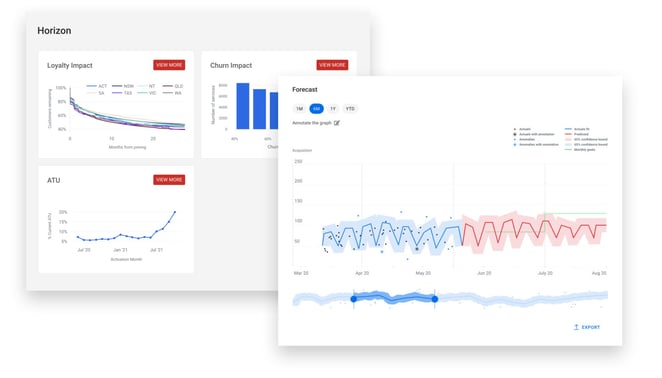In today’s fast-paced and hyper-competitive digital world, brands are recognising more and more how vital it is to leverage data and data science to understand customer behaviours and make strategic business decisions quickly and with confidence.
But when the time comes to adopt a data-driven approach, decision-makers face a big question: do they invest time and money in building bespoke and discrete models, or do they look for an off-the-shelf solution? This is a task that can prove quite difficult given there aren’t many purpose-built data science platforms made for business folks (there are plenty of toolsets for data scientists!).
While building custom models sounds like a sensible approach to achieve the best outcomes, there are many factors that need to be considered. In this article, we look at these factors and the different challenges that building data science capabilities in-house can cause, particularly for disruptive challenger brands. We also explain why a market-ready solution can often be the more practical and commercially astute choice – especially if you can find tools and vendors that intimately understand your industry and its challenges.
1. ROI
Building data science models from scratch is a huge financial commitment, with extremely high upfront costs for resourcing and technology infrastructure along with the ongoing costs of regular updates, maintenance, and scalability upgrades.
Typically, you need to bring a minimum of three roles together to build a useful model – a data scientist, a business analyst, and a data analyst. Plus, there’s time and input needed from engineering, testing, business owners, and solution architects to ensure the model can be moved into production, yields the right outcomes, and can be turned into a set of predictions that will ultimately create value.
In contrast, licensing a platform that serves those same needs can offer a faster ROI – in some cases in under 12 months. A predictable regular payment through a subscription model eliminates the upfront costs and limits the need for business analysts and data analysts. It also reduces the need and commitment of a broader project team. Subscription-based pricing models or shared risk reward commercial models can minimise the upfront investment and ensure a managed OPEX commitment. This means decision-makers stay far more in control of budgets, a particularly appealing advantage for challenger brands that have limited resources and many competing IT priorities. It also means they can remain nimble, innovative, and run asset light with lower costs.
2. Time to value
Developing custom models is a time-consuming process. It involves recruiting the right experts, extensive research, designing, developing, and testing – and it’s unlikely to be a winning model straight off the bat. You need to allow time to refine.
Brands that set out on the DIY path for the first time should be mindful of the data pipeline pitfall. If this is the first time you apply data science in your business, you can expect months of time and frustration readying your data, plugging gaps, and turning it into the kind of data that is usable by a machine. And that’s not just a once off; it’s an ongoing challenge that will come up with every new data set you decide to introduce to the model. Every time you put new data into the model, you will have to retrain it too.
If you can find a vendor that offers prebuilt models for your industry, you are at a huge advantage. It means you have a head start on the data preparation and the modelling.
But why look for a vendor that is specialised for your industry? The answer is simple. As industry experts, they know the types of data you have access to and can provide; they have prebuilt models that have already been through extensive R&D; and, most importantly, they know how you will use the outputs of your model. This means you don’t need to contemplate, design, build and test these workflows – they are inherent.
What’s more, platforms that are specifically designed for your industry have data pipelines in production. When there are new data sets or when the model needs refinement or retraining, the effort is considerably less than the effort it takes to build a new model.
By licensing a data science platform, the time-to-market can be reduced by months, and you can expedite the time to value. In many cases, solutions can be implemented almost immediately and fully set up within 6 to 12 weeks.
There are many times where we’ve seen brands take a DIY approach and fail to move a model into production within 12 months. They have then go on to realise a negative ROI from this investment within 24 months. By contrast, we’ve worked with brands who’ve implemented licensed decision intelligence platform and rapidly gone from Day 1 to production for 2 to 3 models within 45 days and achieved an ROI within 8 months, even with modest improvement in metrics like churn.
3. Scalability
As businesses grow, their demands for data driven outcomes inevitably evolve and expand too. Without significant long-term investment from a dedicated team in-house, models that have been custom-built in-house struggle to keep up. Often, as these models become less performant, the operational management is not prioritised in the operational lifecycle, inevitably the data scientist that created the model moves on, and the refinement of the model by a different team member is nearly impossible. This forces leaders into a difficult position where they must decide if they a) invest in rebuilding b) outsource this to a contractor or c) let the model decay and hope for the best.
We have seen many brands that have taken a DIY approach end up with custom models that decay. Often this comes from not having an end-to-end workflow continuously measuring model accuracy and impact, which means the team are totally unaware that their models have drastically decayed.
Ready-made data science platforms that have been designed by industry experts are in their nature scalable. They achieve this by turning data into model features that can be easily and simply reused. Unfortunately, if you’re building data science competency in-house and you’re not making the right investment that’s required, this capability is unlikely to be part of your design ethos. And this means that scalability is very difficult to be built in. Brands that choose a vertical-specific solution are making a choice to invest in scale.
4. Quality and expertise
Building a highly performant model that utilises AI requires an expert team of senior data scientists, data analysts, and decision-makers. Turning this group into a centre of excellence with a focus on operationalising data-driven decision-making requires an even bigger team, one comprising data ops, ML ops, and machine learning specialists. Not only is this a big ask from a resourcing standpoint, but it is also a significant OPEX line item alongside existing martech platforms and operational teams.
Conversely, buying a platform from a high-quality specialised vendor means you can take data science from model to real data driven decision intelligence. At the same, you benefit from the expertise of those people behind the solution (and for no additional cost). For example, Atlas by SourseAI is continually being refined and optimised by SourseAI’s expert team, which includes Australian-based PHD data scientists, senior data scientists, platform engineers, multiple analytics engineers, and ML engineers. Along with their extensive technology nous, they also have practical experience working with global customers and use cases to draw upon.
5. Compliance, security and responsible AI
When building out AI technology, data privacy, ethics, and compliance are all critical areas that must be governed and correctly implemented. Staying up to date with the latest advancements, best practices, and security protocols can be challenging and it requires specialised people in-house to focus solely on that.
Buying an AI platform from a reputable technology provider rather than building it and managing it in-house means you can be confident that there are robust compliance and security frameworks in place, implemented and updated by a dedicated team who know how to navigate the complex landscape of AI regulations. If choosing a platforms, be sure to consider the vendor’s adherence to industry standards, privacy standards and quality standards when making your selection.
6. Support
If you’re at the beginning of your data journey, you’ll need support across the full lifecycle from insight to action. And that’s exactly why industry expertise and specialism is so critical.
If you elect to build in-house, you’re adding extra pressure on your team because you also have to self-support and resolve problems on your own. Whereas, if you buy a platform from a trusted provider, you will have a whole support network dedicated to helping you optimise performance.
OUTRO:
Right now, we know that many decision-makers are grappling with the adoption of AI – and really struggling to stack up from an ROI perspective. The reality is that the successful adoption of AI requires three things:
|
At SourseAI, we recognise these needs – and are committed to helping businesses leverage the power of data science and AI within their business. While a DIY approach to building predictive models may seem like the lowest-cost option, it’s very rarely the case. The practical advantages of licensing a specialised market-ready solution is hard to deny. It is a cost-efficient, and scalable way to begin a data driven journey in your business, with the fastest path to value. It’s also the lowest risk and the most efficient way to equip your leadership team with the insights needed to drive strategy and execution and get you adept at running a data-focussed and fluent business.
Atlas from SourseAI is the rapidly deployable telco-specific decision intelligence platform. It has been built to serve the needs of specific verticals and customers typically start to see actionable insights from the AI models 90 days after data has been ingested, allowing for a very fast route to business growth. It delivers a broad range of different use cases and is designed to deal with the common challenges of industries it intimately understands and create new models by reusing data and features.
It also has the added advantage of being a modular solution, meaning brands can focus on their highest priority business challenges first or simply buy a new module as needs change. And because each model is trained on the brand’s actual data, everything is unique and specific to them – the insights are tuned, the model is accurate, and the impact is great.
Atlas has already been successfully adopted by 12 challenger telco brands around the world, delivering enormous benefits. And the SourseAI team works in partnership with each brand to develop a scaled set of experiments within Atlas that are aligned to their specific business goals.
Our team can help yours, transferring knowledge on what works and what doesn’t, how to harness and understand insights, template your setup, elevate your processes and management, formalise reporting and more. You’re still in control but all the while you have the support and guidance of a dedicated team of data fluent experts and the power of specialised AI-driven decision intelligence platform designed for business executives like you.
|
If you want to find out more about Atlas and discuss how it can enhance your business performance, get in touch with the SourseAI team today. |


